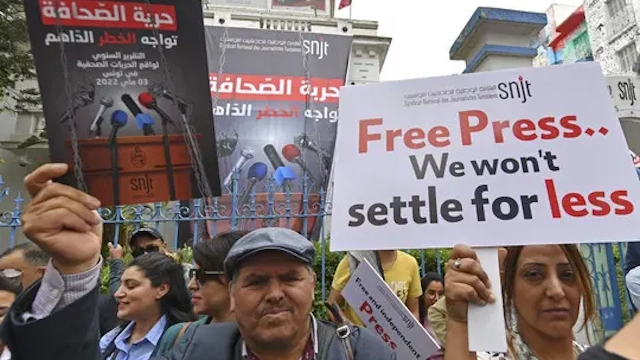Tunisian journalists hold up banners calling for press freedom in front of the headquarters of the National Syndicate of Tunisian Journalists (SNJT) in Tunis on May 5, 2022. (Photo: Fathi Belaid / AFP)
The International Federation of Journalists (FIJ) condemned in a statement the prosecutions of journalists in Tunisia, expressing its deep concern over the escalating security and judicial targeting of media freedom. The Federation affirmed its rejection of the summoning of journalist Hachemi Nouira by the judicial unit in Moknine, based on a complaint filed by the Independent High Authority for Elections due to his statements about the recent presidential elections, which were broadcast on the “9” channel. The Federation considered that these measures aim to restrict the right of journalists to express their opinions and carry out their oversight duty over the electoral process.
This condemnation by the International Federation of Journalists (FIJ) comes in conjunction with a series of other summonses, as a number of journalists were summoned due to their media work. Journalist Khawla Boukrim was questioned on suspicion of assaulting a security officer while covering a demonstration (she was present as a defendant), a photojournalist was arbitrarily detained and his equipment was seized while filming in front of the Ministry of Justice (his equipment was seized after his work on a report on the trials), and journalist Rahma Bahi was summoned to appear before the National Unit for the Investigation of Complex Financial Crimes as a witness.
According to the National Union of Tunisian Journalists, the number of judicial referrals against journalists in 2024 reached 37 cases, with the adoption of punitive legal texts outside the framework of the law regulating journalistic work. The union stressed in its statement that these practices threaten freedom of the press and aim to restrict public criticism directed at the authorities. FIJ and the union called on the Tunisian authorities to stop these prosecutions and respect the right of journalists to practice their work without harassment or threats.
In a strongly worded statement, the International Federation of Journalists (FIJ) called on the Tunisian authorities to respect freedom of the press, stop prosecutions against journalists and ensure that the judiciary is not exploited to prosecute media workers. He expressed his full solidarity with Tunisian journalists, considering these practices “contrary to Tunisia’s international obligations to protect press freedom.”
External photo: Tunis, May 5, 2022 (Fathi Belaid / Agence France-Presse – AFP)





